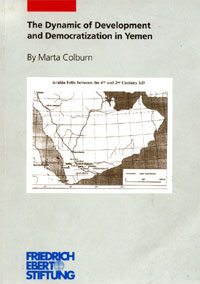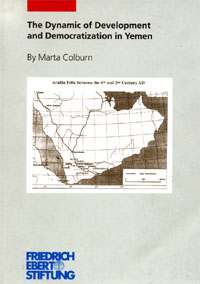
Book Review on Marta Colburns The Dynamic of Development and Democratization in Yemen [Archives:2002/23/Reportage]
June 3 2002
YEMEN TIMES STAFF

This is how Ms. Marta Colburn concluded her study resembled in a book published in April 2002 and entitled The Dynamic of Development and Democratization in Yemen.
Books details
The four-chapter book analyses and presents the development and democratic experience of Yemen during different stages of history, but puts emphasis on the period following Yemens unification in 1990.
The book is not only focusing on the two most essential factors for Yemens future, namely development and democratization, but it also cleverly links them together by explaining the importance of continuing them in the same pace and at the same time. The book, published by Friedrich Ebert Stiftung and sponsored by the US Embassy, starts with an introduction that presents the definitions of democratization and development, and sheds light on the role of the donor community along with a brief description of womens participation. Ms. Marta proceeds in her second chapter by giving a historic background on Yemeni democratic traditions explaining the effects of Islam, tribalism, and other conservative traditions unique to Yemen.
The largest chapter of the book, chapter three, deals with democratization. It presents an analytical approach on how the different elements of the state, such as law enforcement, security, and judiciary have affected the democratization process of the country. The chapter presents an insight into the different electoral processes, political parties, and democratic experiences that Yemen has gone through during 1990-2000.
Interestingly enough, the book includes most development related issues such as human resources, economy, and order of law into this chapter, perhaps by considering development as a major prerequisite for any democratization. The author further confirms the main conclusion of the book saying that, many (challenges facing democratization).. are intimately tied to issues of economic and human development.
The final chapter, The dynamic of democratization and development, which is the same as the books title, is the one that brings all the issues together and presents them in one frame. In this chapter, the author emphasizes the donor communitys role in supporting Yemens development and democratization by focusing on projects that relate to economic and human development including the fields of literacy, civil society, citizen participation, stability, womens participation, and poverty. However, Marta also signals the importance of never abandoning democracy in favor of development. According to her, they should both go along together, each one enforcing the other.
One conclusion, one answer
The book is then concluded with a remark from the Emerging Democracies Forum, held in June 30, 1999: This group of nations with different traditions, cultures and historical experiences was brought together by a shared commitment to democracy and a believe that the promise of economic prosperity enjoyed by all citizens is more likely realized in a democratic political environment based on respect for human rights, popular participation and the rule of law.
The book can be considered a great reference for all those foreigners, researchers, and others interested in knowing about Yemens recent history. In spite of the books tendency to concentrate on democratization and development, it has also provided a reasonably complete background on social, cultural, traditional, and live-related aspects of Yemeni people. The value of the book will certainly be appreciated by readers when read in whole.
About the author
Marta Colburn, an American, has lived in Yemen periodically since 1948. From 1984 to 1989 she worked for a number of international development agencies, the last two and a half years as Deputy Country Representative for Oxfam UK. From 1998 to 2000 she served as Resident Director of the American Institute for Yemeni Studies and, since March 2000, has worked as an independent consultant on a variety of projects in Yemen. Ms Colburns education is in Political Science and Middle Eastern Studies and for eight years she served as the Outreach Coordinator and Associate Director of the Middle East Studies Center at Portland State University. She has written on a range of topics related to Yemen including gender, democratization and pre-collegiate curriculum. Among her unique experiences in Yemen are marriage to a Yemeni, living with a Yemeni family for several years, and her 1999 kidnapping by tribesmen.
——
[archive-e:23-v:2002-y:2002-d:2002-06-03-p:./2002/iss23/report.htm]


